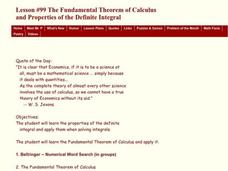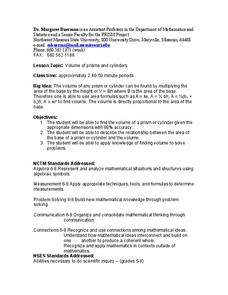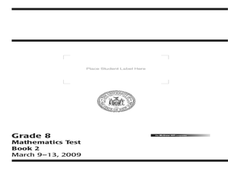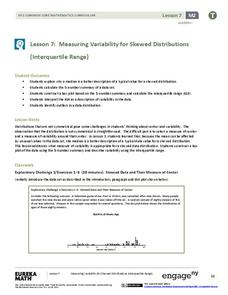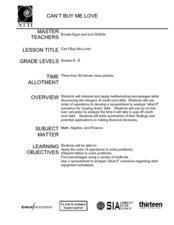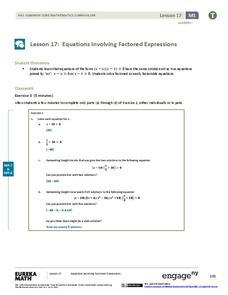Curated OER
Probability: Ratios and Percents
Students investigate ratios and percents. In this algebra instructional activity, students explore the probability of an event occurring. They convert between ratios and percents as they solve the odds.
Curated OER
Grade 2: Texas Problem Solving
Second graders use numerical data about Texas to write and solve real-life problems involving addition and subtraction (or multiplication and division). They work in pairs to choose three numerical facts about Texas to use to make up...
Curated OER
The Fundamental Theorem of Calculus and Properties of the Definite Integral
Young scholars discuss the importance of fundamental theorems in math. In this calculus lesson, students define the fundamental theorem of calculus and discuss why it is so important they understand it. They work problems to model how...
Curated OER
Algebra I: A Draining Swimming Pool
Learners analyze and develop symbolic representations to describe the amount of water left in a pool being pumped out after a given amount of time, with various pumping rates and initial quantities of water in the pool.
Curated OER
Word Problems
Learners solve word problems using mathematical symbols. In this algebra lesson, students collect data and analyze it. They analyze the data using a table or graph after plotting the data.
Curated OER
Who Does the Lottery Benefit?
Students investigate the pros and cons of the lottery. In this algebra instructional activity, students use the formulas for permutation and combination to test their arguments about the lottery. They collect data about their argument...
Curated OER
Volumes of Prisms and Cylinders
Learners calculate the volume of prisms and cylinders. In this geometry lesson plan, students are give part of the formula, and must calculate the missing parts. They use 80% accuracy for their dimensions.
Curated OER
Proportional Problems 1
Eighth graders explore representing fractions as ratios and proportions. They model proportions through the use of blocks, LEGO gears and activities with bicycle gears and pedals. Students work with bicycle gear boxes to observe and...
Curated OER
New York State Testing Program Math Release questions grade 8
In this algebra and geometry activity, students solve seven varying math problems. This activity will help prepare students for standardized tests covering algebra and geometry.
Curated OER
Finding Yourself Through Autobiography
Pupils read the writings of individuals whom they know and admire. They see that writing about themselves is worthwhile and important and helps them become better writers. They share their own life experiences, write about personal...
Curated OER
What's My Rule? Simple Linear Functions
Students investigate simple linear functions by trying to guess a function rule from inputs and outputs. They write the function rule in algebraic form.
Curated OER
Using Series to Analyze Financial Situations: future Value
In this Algebra II/Pre-calculus worksheet, students investigate a method of finding the accumulated value of an annuity by considering it a series. The eleven page worksheet contains explanation, examples, and twenty-three problems....
Curated OER
Composition of Functions
Students solve composition of functions. In this algebra lesson, students find the sum, difference and product of functions. They find the inverse of a function.
EngageNY
Measuring Variability for Skewed Distributions (Interquartile Range)
Should the standard deviation be used for all distributions? Pupils know that the median is a better description of the center for skewed distributions; therefore, they will need a variability measure about the median for those...
Curated OER
Belongs, Doesn't Belong
Fifth graders discover the rule used to sort a set of data into two sets, those data that belong according to the rule and those data that don't belong. Students participate in a game to determine the rule. They discuss strategies for...
Curated OER
Kakuro Puzzle
In this math activity, students solve the number puzzle looking for the missing values. The sheet is intended to be a teacher's guide.
Curated OER
Rational Expressions
In this Algebra II instructional activity, 11th graders simplify rational algebraic expressions by factoring and cancelling the common factors. The two page instructional activity contains instruction, worked examples, and three...
Curated OER
Poppy Meets Pythagoras
Eighth graders find connections between numbers in a table; use Pythagoras' theorem in a general algebraic form; and measure accurately from a scale drawing to find a method that might enable the helicopter to land inside a rectangular...
Curated OER
Cannot Buy Me Love
Students investigate the concepts that are related to finance and how it is used in the world. They take part in activities that are focused around the use of a spreadsheet while using a T-chart to simulate a ledger of credits and debits.
EngageNY
Rearranging Formulas
Model for your learners that if they can solve an equation, they can rearrange a formula with a well-planned activity that has plenty of built-in practice. As the activity progresses the content gets progressively more challenging.
EngageNY
Equations Involving Factored Expressions
Be ready mathematicians of every level. This lesson leads to the discovery of the zero product property and provides challenges for early finishers along the way. At conclusion, pupils understand the process of using the zero product...
West Contra Costa Unified School District
Graphing Piecewise Functions
Step up to learn about step functions. The lesson, designed for high schoolers, first covers piecewise functions and how to draw their graphs. It then introduces step functions, including the greatest integer (floor) and ceiling functions.
Inside Mathematics
Population
Population density, it is not all that it is plotted to be. Pupils analyze a scatter plot of population versus area for some of the states in the US. The class members respond to eight questions about the graph, specific points and...
Curated OER
I Have a Magic Pot
Pupils will explore numbers rules. They will create a picture of their rule and exchange their paper with a classmate. The classmate works to figure out the rule. They then share with each other how they found the rule. Questions are...




